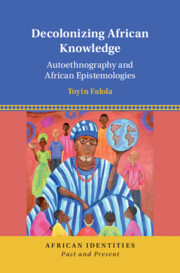Book contents
- Decolonizing African Knowledge
- African Identities: Past and Present
- Decolonizing African Knowledge
- Copyright page
- Dedication
- Contents
- Figures
- Notes on Language and Orthography
- Preface
- Acknowledgments
- Part I Introduction
- Part II History, Fictions, and Factions
- 3 Narrative Politics and Cultural Ideologies
- 4 Memory, Magic, Myth, and Metaphor
- 5 A Poetological Narration of the Nation
- 6 A Poetological Narrative of the Self
- 7 Satire and Society
- 8 Narrative Politics and the Politics of Narrative
- Part III Visual Cultures
- Part IV Conclusion
- Bibliography
- Index
7 - Satire and Society
from Part II - History, Fictions, and Factions
Published online by Cambridge University Press: 23 June 2022
- Decolonizing African Knowledge
- African Identities: Past and Present
- Decolonizing African Knowledge
- Copyright page
- Dedication
- Contents
- Figures
- Notes on Language and Orthography
- Preface
- Acknowledgments
- Part I Introduction
- Part II History, Fictions, and Factions
- 3 Narrative Politics and Cultural Ideologies
- 4 Memory, Magic, Myth, and Metaphor
- 5 A Poetological Narration of the Nation
- 6 A Poetological Narrative of the Self
- 7 Satire and Society
- 8 Narrative Politics and the Politics of Narrative
- Part III Visual Cultures
- Part IV Conclusion
- Bibliography
- Index
Summary
The chapter begins with the concept of satire for the reader’s understanding of its broad and deep meaning and its significance. It proceeds to show the methodology of satire, which is to “highlight” and “ridicule” an act of folly to effect change in an individual, group, or society behind the act. It does this using figurative tools such as humor, hyperbole, irony, or sarcasm. In context, the chapter examines the use of satire and satirical expressions in works to mirror the African society. Importantly, the chapter notes that for satire to be birthed, there must be a set societal standard by which the subject’s action is measured against that which has been breached. While “morality is often the end goal of tales, parables, proverbs, etc., for satire, the concern goes above morality to include public interest.” The chapter finds satire in “songs of abuses,” which is very prominent among the Yoruba. These songs are often sung or performed when people are deemed to have fallen short of societal set standards. Or when criminals such as murderers, thieves, witches, and other extreme violators of social conduct are caught and especially exposed.
Keywords
- Type
- Chapter
- Information
- Decolonizing African KnowledgeAutoethnography and African Epistemologies, pp. 151 - 182Publisher: Cambridge University PressPrint publication year: 2022

